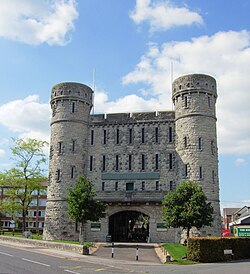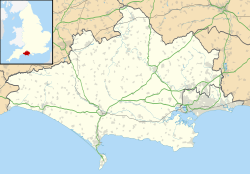
Summary
The Keep, Dorchester is part of the former county barracks of the 39th (Dorsetshire) Regiment of Foot and the 75th (Stirlingshire) Regiment of Foot. The barracks were built in about 1880 and housed various regiments as units were amalgamated. It ceased to be used in 1958 and most of the site was redeveloped in the 1960s, but the keep remained in Ministry of Defence hands and is now used as a regimental museum.
| The Keep, Dorchester | |
|---|---|
| Dorchester | |
 The Keep | |
 The Keep, Dorchester Location within Dorset | |
| Coordinates | 50°42′53″N 02°26′37″W / 50.71472°N 2.44361°W |
| Type | Barracks |
| Site information | |
| Operator | |
| Site history | |
| Built | 1877-1881 |
| Built for | War Office |
| In use | 1881-1958 |
| Garrison information | |
| Occupants | Dorset Regiment |
It is a Grade II listed building.[1]
History of the barracks edit
The Dorchester Depot Barracks were built between 1877 and 1881[2] on the site of a Militia barracks, which had been established there little over a decade earlier.[3] Their creation took place as part of the Cardwell Reforms which encouraged the localisation of British military forces.[4] The site included a large parade ground, which was laid out between the Keep (or armoury) and the building now known as the 'little keep' and flanked by brick-built barrack blocks (including separate accommodation for officers and other ranks), the officers' mess, a gymnasium, stores, offices and other ancillary buildings.[5]
The barracks became the depot for the 39th (Dorsetshire) Regiment of Foot and the 75th (Stirlingshire) Regiment of Foot.[6] Following the Childers Reforms, the 39th (Dorsetshire) Regiment of Foot amalgamated with the 54th (West Norfolk) Regiment of Foot to form the Dorset Regiment with its depot in the barracks in 1881.[6]
During the Second World War the barracks were occupied by 701st Ordnance Light Maintenance Company and the 1st Quartermaster Company of the United States Army.[5]
In 1958 the Dorset Regiment amalgamated with the Devonshire Regiment to form the Devonshire and Dorset Regiment and Regimental Headquarters were re-located to Wyvern Barracks in Exeter.[2] The site of the barracks was redeveloped; some buildings (including the long soldiers' barracks block on the west side) were demolished, but several others were sold, being taken over by the County Council and the Royal Mail in the 1960s; a tax office was built on the parade ground. Only the keep was retained by the Ministry of Defence.[2] In 2016 the Council sold one of the former barrack blocks for conversion into residential properties.[7]
Alongside the depot barracks, across Poundbury Road, stood the older Cavalry Barracks (opened in 1795 and later known as Marabout Barracks).[8] Most of that site remains in military use as Dorchester's Army Reserve Centre.[9]
The museum edit
The keep is now a regimental museum for the Devonshire Regiment, the Dorset Regiment, the Devonshire and Dorset Regiment, The Dorset Yeomanry, Queen's Own Dorset Yeomanry, The Dorset Militia, The Royal Devon Yeomanry and 94 Field Regiment RA.[10] The collection includes Adolf Hitler's desk which was taken from the ruins of the Chancellory in Berlin in 1945.[11]
The museum occupies the keep of the original barracks. It is a Grade II listed building and the ground floor preserves its previous layout. The museum is entered through the ammunition and powder store, and through this is the archway that used to lead to the rest of the barracks. Close to the archway are the guardroom and cells, one of which is equipped as it would have been when it housed prisoners. In the west tower is a rope winding gear to hoist weapons, ammunition and other stores to the upper floors.[12]
The first floor is gained by a spiral stair and is now the regimental museum with a display of uniforms, weapons and equipment used by the regiment during its 300-year history. The second floor has a display of campaign and gallantry medals as well as exhibits showing small arms and silverware. The third floor has displays of objects and information on the recent military history of the regiment, places where it has been deployed and events in which it has taken part. Above this is the battlements where there are extensive views of the town and surrounding countryside.[12]
References edit
- ^ Historic England. "Dorset Military Museum, Dorchester (1324411)". National Heritage List for England. Retrieved 22 June 2022.
- ^ a b c "The Depot Barracks". The Keep Military Museum. Archived from the original on 28 May 2014. Retrieved 26 May 2014.
- ^ "The Militia Barracks". The Keep Military Museum. Retrieved 2 June 2018.
- ^ "Echoes of the past in these Army cuts". The Telegraph. 8 July 2012. Retrieved 13 November 2014.
- ^ a b "The Keep Today". The Keep Military Museum. Archived from the original on 28 May 2014. Retrieved 26 May 2014.
- ^ a b "Training Depots". Regiments.org. Archived from the original on 10 February 2006. Retrieved 16 October 2016.
{{cite web}}: CS1 maint: bot: original URL status unknown (link) - ^ "Dorchester barracks set to be developed". Dorset Echo. Retrieved 31 May 2018.
- ^ Douet, James (1998). British Barracks 1600-1914: their Architecture and Role in Society. London: The Stationery Office.
- ^ "Dorchester Army Reserve Centre". Alternative Venues. Retrieved 2 June 2018.
- ^ "Welcome". The Keep Military Museum. Retrieved 26 May 2014.
- ^ "The Keep Military Museum". Dorset Bay. Archived from the original on 28 May 2014. Retrieved 26 May 2014.
- ^ a b "Museum Guide". The Keep Military Museum. Retrieved 24 August 2016.[dead link]
External links edit
- Museum website
- The Keep Military Museum
- Dorchester barracks: marketing website for residential properties


